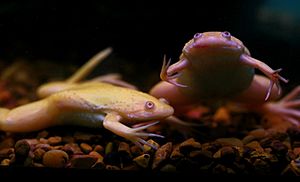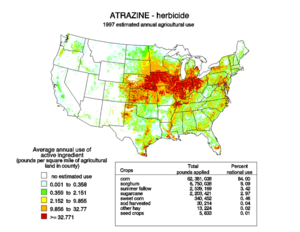Tyrone Hayes facts for kids
Quick facts for kids
Tyrone Hayes
|
|
|---|---|

Hayes at King University in 2013
|
|
| Born | July 29, 1967 Columbia, South Carolina, U.S.
|
| Education | Harvard University (BA, MA) University of California, Berkeley (PhD) |
| Occupation | Professor |
Tyrone B. Hayes (born July 29, 1967) is an American biologist and professor at the University of California, Berkeley. He is famous for his studies on frogs. His research showed that a chemical called atrazine, used to kill weeds, can change how male frogs develop. It can make them show female traits.
Hayes believes that chemicals like pesticides need to be checked carefully. He thinks they should be regulated to protect health. He has given many talks about how chemicals in the environment affect amphibians around the world. He also links these chemicals to health problems in minority and lower-income communities.
Some groups, like Syngenta (who make atrazine) and the Australian Pesticides and Veterinary Medicines Authority, have disagreed with Hayes's findings. In 2023, he was chosen to be a member of the National Academy of Sciences.
Contents
Early Life and Education
Tyrone Hayes was born in Columbia, South Carolina, in 1967. As a child, he loved studying lizards and frogs. He was especially interested in how tadpoles change into adult frogs. He even won a state science fair. His project showed that anole lizards had to be awake to change their color.
He finished high school in 1985. Then, he went to Harvard University. He earned degrees in biology in 1989. His main project there was about how genes and the environment decide if a wood frog is male or female. He continued his studies at the University of California, Berkeley. In 1993, he earned his PhD. His research focused on how hormones help amphibians change and grow when their environment changes.
A Scientist's Journey
After graduating from Harvard University, Hayes worked as a technician and consultant for a company called Biosystems, Inc. This was from 1990 to 1992. Since 1992, Hayes has been a professor at the University of California, Berkeley. He started as an instructor and became a full professor in 2003. In 2021, he became a co-chair of his department. In 2023, he took on a new role. He became an associate dean for Diversity, Equity, and Inclusion at Berkeley.
Hayes's scientific work has focused on how animals can adapt their genes. He also studies how hormones affect the development of amphibians. His studies have shown that chemicals, like a common weed killer, can harm how amphibians develop. This can happen even if there are only small amounts of these chemicals. Hayes is also interested in how hormones control aggressive behavior. He has been part of the National Science Foundation Review Panel since 1995. He has also served on several other important advisory groups.
Research on Atrazine
In 1997, a company hired Hayes to study the weed killer atrazine. This company was Novartis, which later became Syngenta. Hayes found some unexpected harmful effects from atrazine. He told the company about his findings, but they did not want to accept them. He wanted to do more tests to confirm his results. However, Novartis would not give him more money for research. So, he left the project and found other funding to repeat his experiments.
In 2002, Hayes published his findings. He reported that male African clawed frogs and leopard frogs developed unusual traits after being exposed to atrazine. These traits were similar to those found in female frogs. He published this work in important science journals like Proceedings of the National Academy of Sciences (PNAS) and Nature.
In 2007, Hayes helped write a paper. It said that atrazine caused certain types of tumors in lab animals. It also suggested atrazine could cause similar problems in humans. In 2010, Hayes published more research in PNAS. This work showed how atrazine exposure made male tadpoles develop into females. These females also had trouble having babies.
The U.S. Environmental Protection Agency (EPA) looked at all the studies on atrazine. They concluded that atrazine does not harm how amphibian reproductive organs develop. This was based on many lab and field studies. The EPA also gave advice on how to design future studies. Two studies were done following the EPA's guidelines. They found that long-term exposure to atrazine did not affect growth or development in frogs. A report in Environmental Science and Technology also mentioned that scientists in Japan could not get the same results as Hayes.
In 2010, the Australian Pesticides and Veterinary Medicines Authority (APVMA) responded to Hayes's paper. They stated that his findings were not enough to change their current rules.
Speaking Up for Safety
Since publishing his research, Hayes has become a strong supporter of banning atrazine. He says that atrazine affects hormone production in many animals, including fish, frogs, alligators, birds, turtles, rats, and human cells. He believes that there is a lot of evidence showing atrazine is a risk to wildlife and people. He travels and gives many talks to both scientists and the public.
Hayes has also talked about environmental racism. He warns that people from minority or low-income groups are more likely to live in areas with more pollution. He has appeared on TV shows, like Strange Days on Public Broadcasting Service. He shared his worries about how farm chemicals affect human health, especially for minority and low-paid workers.
Research by Hayes and other scientists was used in a lawsuit against Syngenta. Many water companies in Illinois sued Syngenta. The lawsuit was settled for 105 million dollars in 2012. This money helped over 1,000 water systems pay to filter atrazine from drinking water. Syngenta, however, said they did nothing wrong.
Disagreement with Syngenta
There has been a long disagreement between Tyrone Hayes and Syngenta, the company that makes atrazine. A writer for Mother Jones magazine called it "one of the weirdest feuds in the history of science."
In 2014, New Yorker magazine reported that Syngenta might have tried to discredit Hayes. They may have also tried to discredit other scientists whose studies showed atrazine had harmful effects.
The article said that Syngenta criticized Hayes's science and behavior. They did this in press releases and letters. They also filed a formal complaint against him at the University of California-Berkeley. Internal Syngenta documents from 2005 were released in a lawsuit. These documents showed how Syngenta planned to discredit Hayes. This included trying to get his work removed from journals. They also investigated his funding and private life.
One email from 2005 showed that Syngenta's consultants planned to track Hayes's talks. They wanted to prepare audiences with Syngenta's opposing views on atrazine. Syngenta later said that many of the ideas in these documents were "never implemented."
Films and Books About His Work
Hayes's work was shown in the 2008 film Flow: For Love of Water. In 2010, Hayes and filmmaker Penelope Jagessar Chaffer gave a TED Talk together. They talked about how chemicals affect pregnant women. This was related to Jagessar's film, Toxic Baby. He also appeared in the 2012 film Last Call at the Oasis.
Tyrone Hayes is the main person in a children's book called The Frog Scientist, first published in 2009. He gave another TED Talk in 2018. This talk was about his early interest in science and frogs. It also covered his career, his research on chemicals, and his ongoing disagreement with Syngenta. He also spoke about how harmful chemicals affect minority and poor communities more. In 2019, another children's book, "There's Something in the Water," was published about Hayes. It focuses on his early life and how his observations as a child led to his passion for studying frogs.
Personal Life
Hayes lives in California with his wife, Kathy Kim. He has won several awards for his teaching and research. These include the Distinguished Teaching Award from University of California, Berkeley in 2002. He also received the President's Citation Award in 2004. In 2005, he was given the National Geographic Emerging Explorer Award and the Jennifer Altman Award.
See also
- Ecophysiology
- Environmental toxicology
- Environmentalism
- Pesticides in the United States
 | Janet Taylor Pickett |
 | Synthia Saint James |
 | Howardena Pindell |
 | Faith Ringgold |



